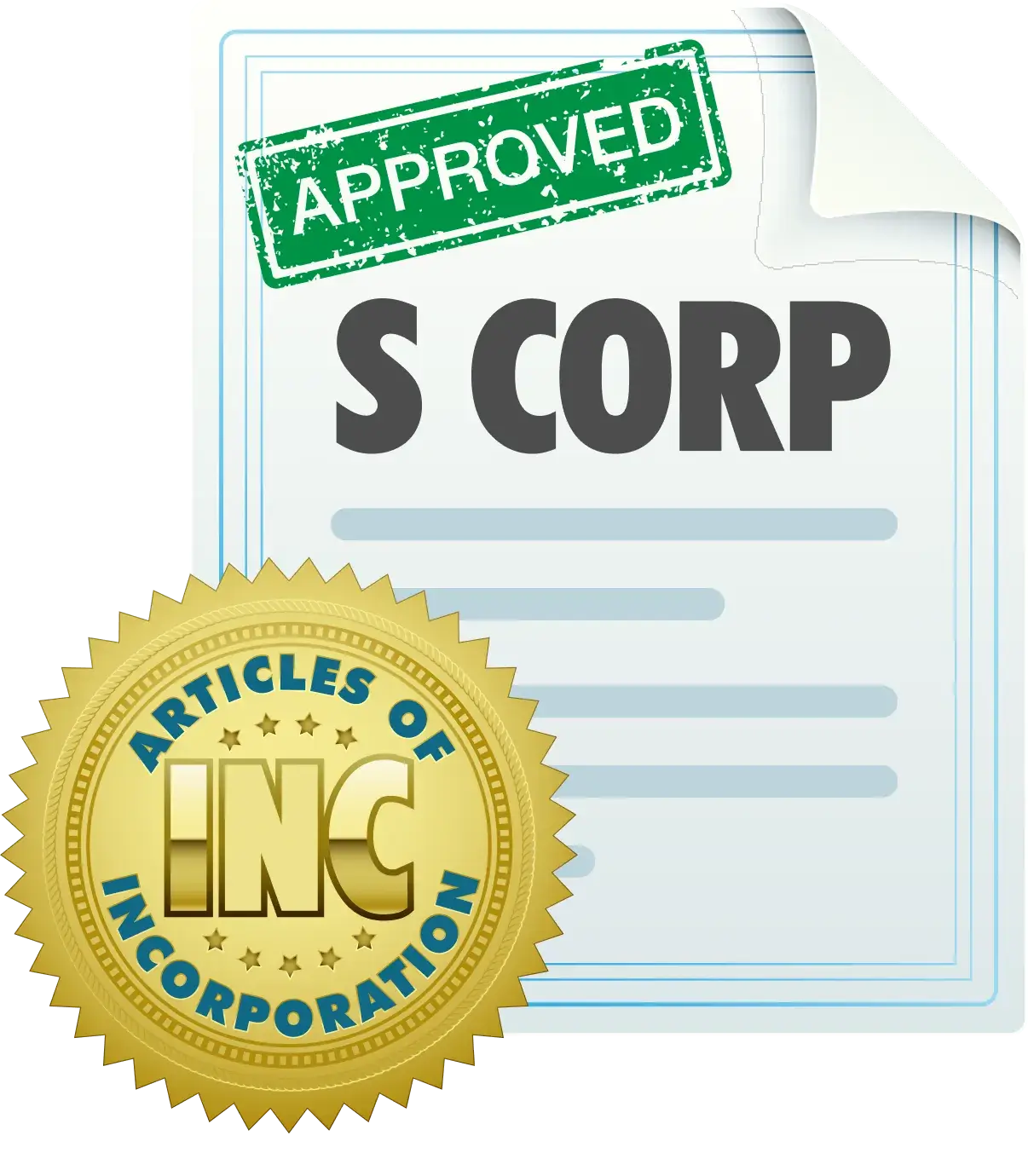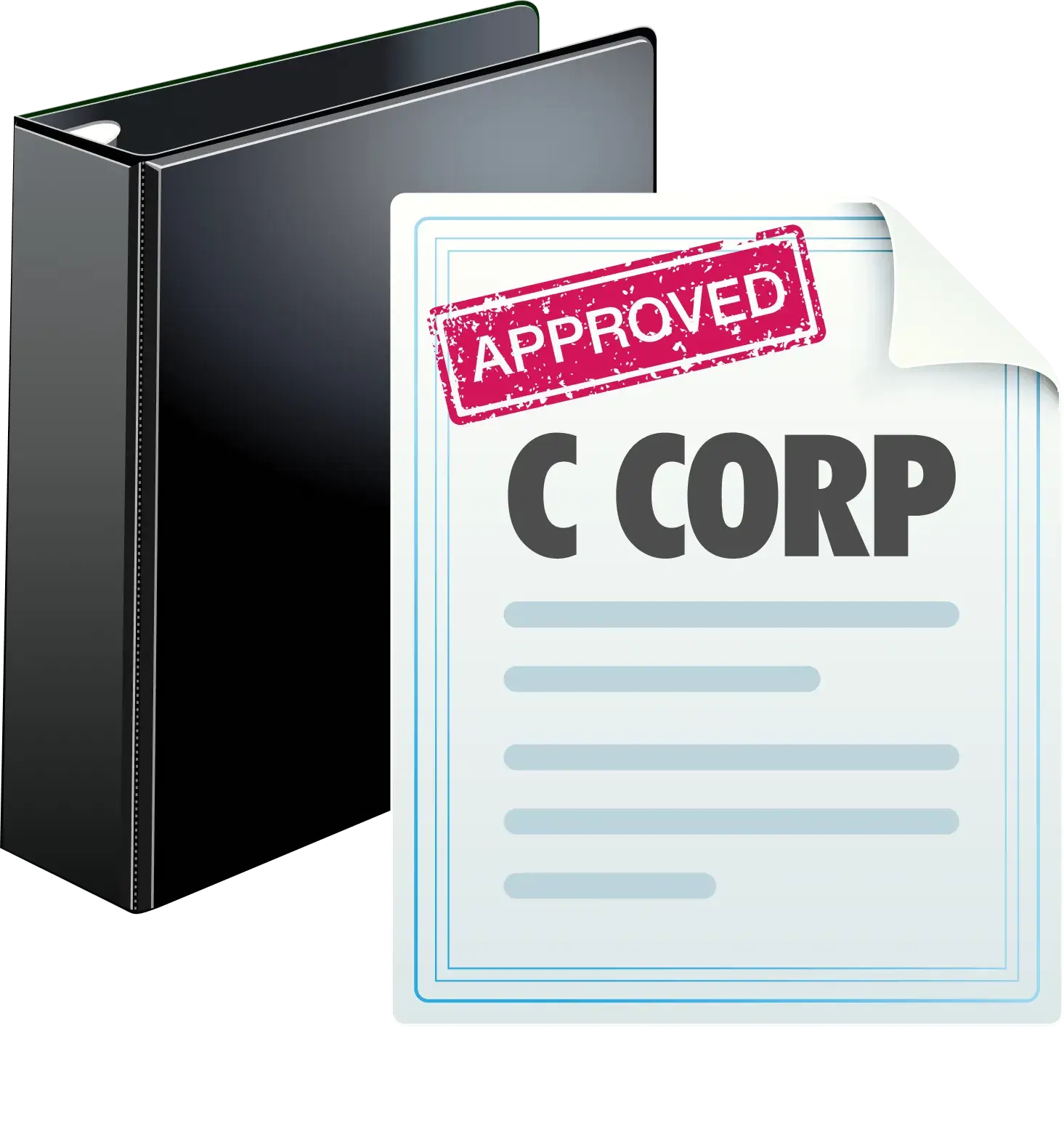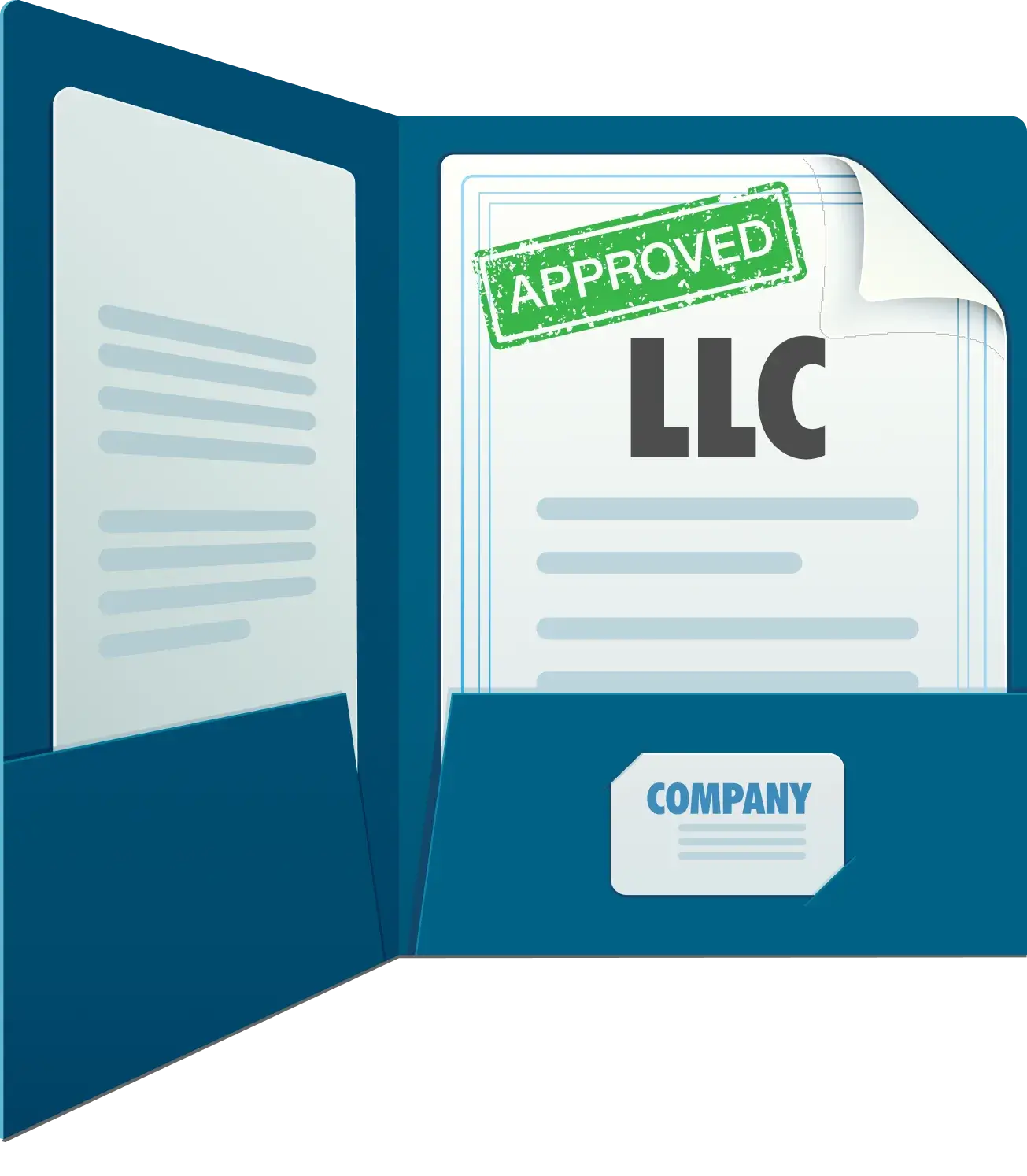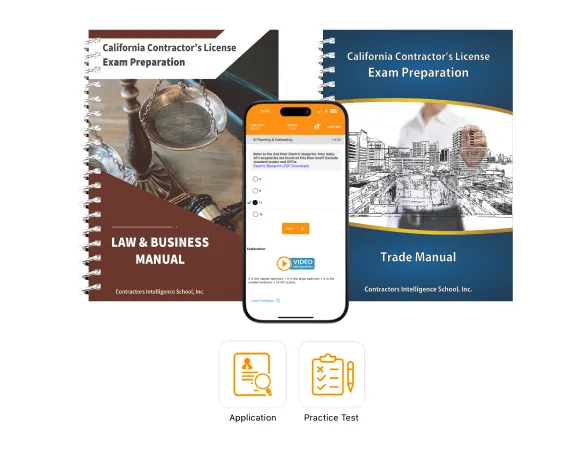
Why Choose an
S-Corporation for Your
Contracting Business?
An S-Corporation (S-Corp) is a business structure commonly used by contractors who want corporate liability protection with pass-through tax treatment. A business must first form a corporation and then elect S-Corporation tax status with the IRS.
For federal income tax purposes, S-Corporations are generally taxed as pass-through entities. This means profits and losses are reported on the owners’ personal tax returns rather than being taxed at the corporate level.
S-Corporations may offer potential savings on self-employment taxes. Owners who work in the business are required to pay themselves a reasonable salary subject to payroll taxes, while remaining profits may be taken as distributions that are generally not subject to self-employment tax.
To form an S-Corporation in California, you must file incorporation documents with the California Secretary of State, obtain an EIN, and elect S-Corporation status with the IRS. When properly maintained, this structure helps separate personal assets from business liabilities and is subject to California franchise taxes and state filing requirements.
We Can Help You Get Incorporated for as Low as $497
Advantages:
-
 Pass-Through Taxation: Profits and losses pass through to shareholders’ personal tax returns, avoiding corporate-level income tax.
Pass-Through Taxation: Profits and losses pass through to shareholders’ personal tax returns, avoiding corporate-level income tax. -
 Liability Protection: Shareholders’ personal assets are generally protected from business debts and liabilities when corporate formalities are followed.
Liability Protection: Shareholders’ personal assets are generally protected from business debts and liabilities when corporate formalities are followed. -
 Potential Payroll Tax Savings: Owners must pay themselves a reasonable salary that is taxed through payroll, while remaining profits may be taken as distributions that are not subject to self-employment tax.
Potential Payroll Tax Savings: Owners must pay themselves a reasonable salary that is taxed through payroll, while remaining profits may be taken as distributions that are not subject to self-employment tax. -
 Credibility: Operating as an incorporated business can enhance credibility with clients, lenders, and vendors.
Credibility: Operating as an incorporated business can enhance credibility with clients, lenders, and vendors. -
 Continuity: The corporation can continue to exist even if ownership changes, subject to S-Corporation eligibility requirements.
Continuity: The corporation can continue to exist even if ownership changes, subject to S-Corporation eligibility requirements.
Disadvantages:
-
 Complexity and Costs: S-Corporations are more complex and costly to set up and maintain than sole proprietorships or partnerships.
Complexity and Costs: S-Corporations are more complex and costly to set up and maintain than sole proprietorships or partnerships. -
 Ongoing Formalities: S-Corporations must maintain corporate records, follow compliance requirements, and observe corporate formalities.
Ongoing Formalities: S-Corporations must maintain corporate records, follow compliance requirements, and observe corporate formalities. -
 California Franchise Tax: In California, corporations are subject to annual state tax and filing requirements, regardless of business activity.
California Franchise Tax: In California, corporations are subject to annual state tax and filing requirements, regardless of business activity.
FAQ
What are the requirements to qualify for an S-Corporation in California?
To qualify for S-Corporation tax status, your business must meet IRS eligibility requirements, including:
- Domestic Corporation: The business must be incorporated in the United States (including California).
- Shareholders: The corporation may have up to 100 shareholders. Shareholders must generally be U.S. citizens or U.S. resident aliens and meet IRS eligibility rules.
- Stock Structure: The corporation may issue only one class of stock.
- Eligible Businesses: Certain entities, such as some financial institutions and insurance companies, are not eligible for S-Corporation status.
Once these requirements are met, S-Corporation status is elected by filing IRS Form 2553 after the corporation is formed
What is the difference between a shareholder and an owner in an S-Corporation?
In an S-Corporation, ownership is represented by shares of stock.
- A shareholder is an individual or eligible entity that owns shares in the corporation.
- The term owner is commonly used to describe a shareholder’s overall interest in the business, including profit participation and decision-making authority.
In practice, all owners of an S-Corporation are shareholders.
Can I form an S-Corporation if I am the only owner?
Yes. An S-Corporation may have a single shareholder, and many S-Corporations are owned by one individual.
Do I need to own a certain percentage of the S-Corporation?
No. There is no minimum ownership percentage required. Shareholders may own varying percentages of the corporation, as long as there is only one class of stock.
Can I elect S-Corporation status if I have an ITIN
S-Corporation shareholders must meet IRS eligibility requirements. Generally, shareholders must be U.S. citizens or U.S. resident aliens. Eligibility is determined by tax residency status rather than the type of taxpayer identification number alone. It is recommended to consult a tax professional to confirm eligibility.
What titles do I need to hold in an S-Corporation?
S-Corporations typically have officer roles such as President, Secretary, and Treasurer. In many small or single-owner S-Corporations, one individual may hold all officer positions.
How will I be taxed as an S-Corporation?
An S-Corporation generally does not pay federal income tax at the business level. Instead, profits and losses pass through to the owners' personal tax returns. Owners who work in the business are required to pay themselves a reasonable salary that is subject to payroll taxes, while additional profits may be taken as distributions that are generally not subject to self-employment tax.
Incorporate as an S-Corporation Today with Contractors Intelligence School

Why Choose an
C-Corporation for Your
Contracting Business?
A C-Corporation (C-Corp) is the default corporate structure for California contractors unless S-Corporation status is elected. It is commonly used by businesses that want flexible ownership options and plan for long-term growth.
C-Corporations pay federal income tax on business profits. If profits are distributed as dividends, shareholders may also pay tax on those dividends, commonly referred to as double taxation.
This structure allows for unlimited shareholders and multiple classes of stock, which can make it attractive for contractors looking to reinvest profits or bring on investors.
To form a C-Corporation in California, you must file Articles of Incorporation with the California Secretary of State and obtain an Employer Identification Number (EIN) from the IRS. C-Corporations are subject to ongoing California filing requirements and an annual franchise tax. When corporate formalities are properly maintained, this structure helps separate personal assets from business liabilities.
We Can Help You Get Incorporated for as Low as $497
Advantages:
-
 Liability Protection: When corporate formalities are properly maintained, a C-Corporation helps separate shareholders’ personal assets from business debts and liabilities.
Liability Protection: When corporate formalities are properly maintained, a C-Corporation helps separate shareholders’ personal assets from business debts and liabilities. -
 Unlimited Shareholders: C-Corporations may have an unlimited number of shareholders, which can make raising capital easier.
Unlimited Shareholders: C-Corporations may have an unlimited number of shareholders, which can make raising capital easier. -
 Multiple Classes of Stock: C-Corporations may issue multiple classes of stock, providing flexibility in ownership and investment structure.
Multiple Classes of Stock: C-Corporations may issue multiple classes of stock, providing flexibility in ownership and investment structure. -
 Credibility: Operating as an incorporated business can enhance credibility with clients, lenders, and partners.
Credibility: Operating as an incorporated business can enhance credibility with clients, lenders, and partners. -
 Continuity: A C-Corporation can continue to exist even if ownership changes, including when shares are sold or transferred.
Continuity: A C-Corporation can continue to exist even if ownership changes, including when shares are sold or transferred.
Disadvantages:
-
 Double Taxation: C-Corporations are subject to federal income tax at the corporate level, and shareholders may also be taxed on dividends they receive.
Double Taxation: C-Corporations are subject to federal income tax at the corporate level, and shareholders may also be taxed on dividends they receive. -
 Complexity and Costs: C-Corporations are generally more complex and costly to form and maintain than sole proprietorships or partnerships.
Complexity and Costs: C-Corporations are generally more complex and costly to form and maintain than sole proprietorships or partnerships. -
 Ongoing Formalities: C-Corporations must follow corporate compliance requirements, including maintaining records and observing corporate formalities.
Ongoing Formalities: C-Corporations must follow corporate compliance requirements, including maintaining records and observing corporate formalities.
FAQ
What are the requirements to form a C-Corporation in California?
To operate as a C-Corporation in California, your business must meet the following general requirements:
- Domestic Corporation: The business must be incorporated in the United States, including California, by filing Articles of Incorporation with the California Secretary of State.
- Shareholders: C-Corporations may have an unlimited number of shareholders, including individuals or entities, and shareholders may be U.S. or foreign persons.
- Stock Structure: C-Corporations may issue multiple classes of stock, allowing for flexible ownership and investment arrangements.
- Eligible Businesses: Most types of businesses are eligible to operate as C-Corporations under federal and California law.
After incorporation, the business must obtain an Employer Identification Number (EIN) from the IRS and comply with applicable federal and California tax and filing requirements.
Can I form a C-Corporation if I am the only owner?
Yes. A C-Corporation may be formed with a single shareholder, and many C-Corporations are owned by one individual.
Do I need to own a certain percentage of a C-Corporation?
No. There is no minimum ownership percentage required. Shareholders may own varying percentages of a C-Corporation.
Can I form a C-Corporation if I have an ITIN?
Yes. C-Corporations may have U.S. or foreign shareholders. Shareholders who are not eligible for a Social Security Number may use an Individual Taxpayer Identification Number (ITIN) to meet U.S. tax filing requirements, subject to IRS rules.
Shareholder tax obligations vary based on residency and individual circumstances.
What titles do I need to hold in a C-Corporation?
C-Corporations typically have officer roles such as President, Secretary, and Treasurer. In many small or single-owner C-Corporations, one individual may hold all officer positions.
How will I be taxed as a C-Corporation?
A C-Corporation is subject to federal income tax at the corporate level. If profits are distributed to shareholders as dividends, those dividends may also be taxed on the shareholders’ personal tax returns, commonly referred to as double taxation. Depending on how profits are retained or distributed, this structure may allow for reinvestment of earnings and other tax planning considerations.
Tax treatment depends on how profits are distributed and individual circumstances.
What is the main difference between a C-Corporation and an S-Corporation?
The primary difference is how the two entities are taxed. A C-Corporation is subject to federal income tax at the corporate level, and shareholders may also be taxed on dividends they receive. An S-Corporation, by contrast, is generally taxed as a pass-through entity, meaning profits and losses are reported on the shareholders’ personal tax returns rather than being taxed at the corporate level.
Do I need a California address to form a C-Corporation?
No. You do not need a personal or business address in California to form a C-Corporation, as long as you designate a California Agent for Service of Process, which is an individual or company authorized to receive legal and official documents on behalf of the corporation.
If you need help designating a California Agent for Service of Process, our team can assist.
Incorporate as a C-Corporation Today with Contractors Intelligence School

Why Choose an LLC for Your Contracting Business?
An LLC is a popular business structure for contractors who want personal liability protection with flexible management and tax options. When properly maintained, an LLC helps separate personal assets from business debts and obligations.
By default, LLCs are generally taxed as pass-through entities, meaning profits and losses are reported on the members’ personal tax returns rather than being taxed at the business level. LLCs may also elect different tax treatment with the IRS depending on business needs.
LLCs offer operational flexibility and generally have fewer ongoing compliance requirements than corporations, making them a practical option for contractors seeking simplicity.
To form an LLC, you must file Articles of Organization with the California Secretary of State, obtain an Employer Identification Number (EIN) from the IRS, and meet applicable state requirements. In California, LLCs are subject to ongoing state filing requirements and an annual franchise tax or fee.
We Can Help You Form an LLC Starting at $497
Advantages:
-
 Liability Protection: When properly maintained, an LLC helps separate members’ personal assets from business debts and liabilities.
Liability Protection: When properly maintained, an LLC helps separate members’ personal assets from business debts and liabilities. -
 Pass-Through Taxation: LLCs are generally taxed as pass-through entities by default, meaning profits and losses are reported on the members’ personal tax returns rather than being taxed at the business level.
Pass-Through Taxation: LLCs are generally taxed as pass-through entities by default, meaning profits and losses are reported on the members’ personal tax returns rather than being taxed at the business level. -
 Management Flexibility: LLCs may be managed by the members or by appointed managers, providing flexible operational and management structures.
Management Flexibility: LLCs may be managed by the members or by appointed managers, providing flexible operational and management structures. -
 Credibility: Operating as an LLC can enhance credibility with clients, vendors, and business partners.
Credibility: Operating as an LLC can enhance credibility with clients, vendors, and business partners. -
 Fewer Formalities: Compared to corporations, LLCs generally have fewer ongoing formalities, such as no requirement for annual shareholder meetings or extensive corporate record-keeping.
Fewer Formalities: Compared to corporations, LLCs generally have fewer ongoing formalities, such as no requirement for annual shareholder meetings or extensive corporate record-keeping.
Disadvantages:
-
 Self-Employment Taxes: Members who actively participate in the business may be subject to self-employment taxes on their share of the LLC’s income, depending on the LLC’s tax classification.
Self-Employment Taxes: Members who actively participate in the business may be subject to self-employment taxes on their share of the LLC’s income, depending on the LLC’s tax classification. -
 Complexity and Costs: LLCs are generally more complex and costly to form and maintain than sole proprietorships or general partnerships.
Complexity and Costs: LLCs are generally more complex and costly to form and maintain than sole proprietorships or general partnerships.
California-Specific CSLB Requirements for Contractor LLCs:
$100,000 LLC Employee/Worker Bond
Contractor LLCs licensed by the California Contractors State License Board (CSLB) must maintain an additional $100,000 LLC Employee/Worker Bond (in addition to the standard $25,000 contractor license bond). This bond is required for the issuance, renewal, reactivation, or reinstatement of an LLC contractor license and is intended to protect employees or workers if the LLC fails to pay wages, benefits, or other required contributions. (B&P Code § 7071.6.5)
$1 Million Liability Insurance Minimum
The CSLB also requires contractor LLCs to carry commercial general liability insurance with a minimum aggregate limit of $1 million for licensees with five or fewer personnel of record. An additional $100,000 in coverage is required for each additional member of the personnel of record, up to a total required coverage limit of $5 million. (B&P Code § 7071.19)
FAQ
What are the requirements to form an LLC in California?
To form a California (domestic) LLC, the following general requirements apply:
- California LLC: The business must be organized as a California LLC by filing Articles of Organization with the California Secretary of State.
- Members: LLCs may have one or more members, and members may be U.S. or foreign individuals or entities, subject to applicable laws and tax requirements.
- Filing Requirements: Most LLCs obtain an Employer Identification Number (EIN) from the IRS for tax, banking, and compliance purposes.
Businesses formed outside California are required to register as foreign LLCs with the California Secretary of State to obtain a California contractor license. See our Foreign Corporations & LLCs page for more information.
How will I be taxed as an LLC?
By default, an LLC is generally taxed as a pass-through entity, meaning profits and losses are reported on the members’ personal tax returns rather than being taxed at the business level. Members pay income tax on their share of the LLC’s earnings, and members who actively participate in the business may also be subject to self-employment taxes. LLCs may elect different tax treatment with the IRS depending on business needs.
What is the main difference between a California corporation and an LLC?
The main difference is how they are structured and taxed. Corporations follow a more formal structure and may be taxed as either a C-Corporation (taxed at the corporate level) or an S-Corporation (generally taxed as a pass-through entity). LLCs offer more flexible management and are generally taxed as pass-through entities by default.
For California contractors, another key difference is that the CSLB requires LLCs to carry additional protections, including an LLC Employee/Worker Bond and commercial general liability insurance, which are not required for all corporation types.
Do I need to have a California address to form an LLC?
No. You do not need a personal or business address in California to form a California LLC. However, you are required to designate a California Agent for Service of Process, which is an individual or company authorized to receive legal and official documents on behalf of the LLC and must have a physical California address.
If you need help designating a California Agent for Service of Process, our team can assist.
What is the difference between a member and a manager in an LLC?
In an LLC, members are the owners of the business. Managers handle the day-to-day operations and may be appointed by the members. Members can also serve as managers, depending on how the LLC is set up.
Can an individual form an LLC as the sole owner?
Yes. An LLC may be formed by a single individual and operated as a single-member LLC.
Do I need to own a certain percentage of the LLC?
No. There is no minimum ownership percentage required. Members may own varying percentages of the LLC.
Form an LLC Today with Contractors Intelligence School

Foreign Corporations & LLC's Registration
If your corporation or LLC was formed outside of California and you plan to conduct business in California, you are generally required to register with the California Secretary of State as a foreign corporation or foreign LLC.
This process allows your existing out-of-state business to legally operate in California without creating a new entity. Foreign registration is similar to forming a new business in California, but it includes additional requirements.
To register, you must file the appropriate foreign registration form with the California Secretary of State and provide a Certificate of Good Standing (or equivalent document) from the state where your business was originally formed.
We Can Help You Register Your Foreign LLC or Corporation in California Starting at $497
California-Specific CSLB Requirements for Contractor Foreign LLCs:
$100,000 LLC Employee/Worker Bond
Contractor LLCs licensed by the California Contractors State License Board (CSLB) must maintain an additional $100,000 LLC Employee/Worker Bond (in addition to the standard $25,000 contractor license bond). This bond is required for the issuance, renewal, reactivation, or reinstatement of an LLC contractor license and is intended to protect employees or workers if the LLC fails to pay wages, benefits, or other required contributions. (B&P Code § 7071.6.5)
$1 Million Liability Insurance Minimum
The CSLB also requires contractor LLCs to carry commercial general liability insurance with a minimum aggregate limit of $1 million for licensees with five or fewer personnel of record. An additional $100,000 in coverage is required for each additional member of the personnel of record, up to a total required coverage limit of $5 million. (B&P Code § 7071.19)
FAQ
What are the requirements to register a foreign corporation or LLC in California?
- Certificate of Good Standing: You must provide a Certificate of Good Standing (or equivalent document) from the state where your business was originally formed.
- Registration Form: You must file the appropriate foreign registration form with the California Secretary of State (such as Form LLC-5 for foreign LLCs and the applicable foreign corporation registration form for corporations).
- California Compliance Requirements: Once registered, foreign entities must comply with California's ongoing filing and tax requirements. Contractors may also need to meet additional CSLB licensing requirements, including bonding and insurance, depending on the license type.
Do I need to have a California address to register a foreign corporation or LLC?
No. You do not need a personal or business address in California to register a foreign corporation or LLC. However, you are required to designate a California Agent for Service of Process, which is an individual or company authorized to receive legal and official documents on behalf of the entity and must have a physical California address.
If you need help designating a California Agent for Service of Process, our team can assist.
What is the purpose of a Certificate of Good Standing?
A Certificate of Good Standing is a document issued by the state where your business was originally formed. It confirms that your business is active and in good standing with the state, meaning required filings have been made and the entity is authorized to do business under that state’s rules.
Can a foreign corporation or LLC have multiple owners or members?
Yes. Foreign corporations and LLCs may have multiple owners. Corporations may have multiple shareholders, and LLCs may have multiple members. Ownership percentages may vary depending on how the entity is structured and documented. Eligibility and tax requirements may also vary based on the owners’ residency and entity type.
What is an Agent of Service of Process?
An Agent of Service of Process, also known as a Registered Agent, is a person or entity designated to receive legal documents on behalf of the corporation or LLC. This role is crucial for ensuring that the business can be properly served with legal notices and other important documents.
How will my foreign corporation or LLC be taxed in California?
Foreign corporations and LLCs are generally subject to California taxes on income derived from business conducted in the state. The type and amount of tax depend on the entity’s structure and tax classification.
In addition to income taxes, foreign corporations and LLCs may be subject to California’s annual franchise tax and ongoing filing requirements. Tax obligations vary based on business activity, revenue, and tax elections.
Because tax treatment depends on individual circumstances, it is advisable to consult a qualified tax professional regarding your specific obligations.
Register Your Foreign LLC or Corporation Today with Contractors Intelligence School











